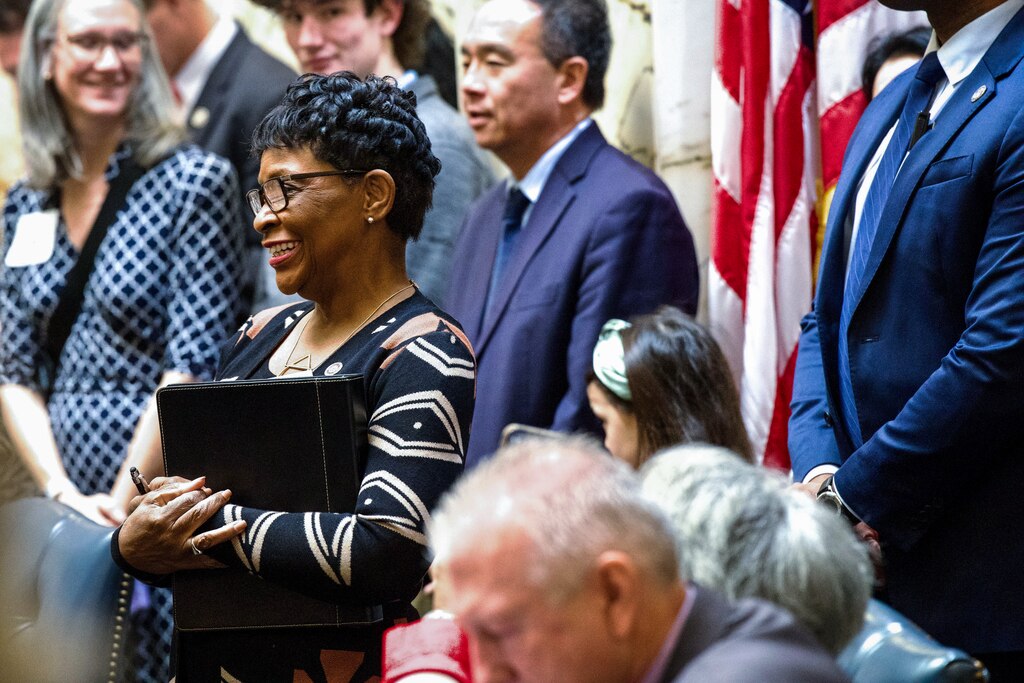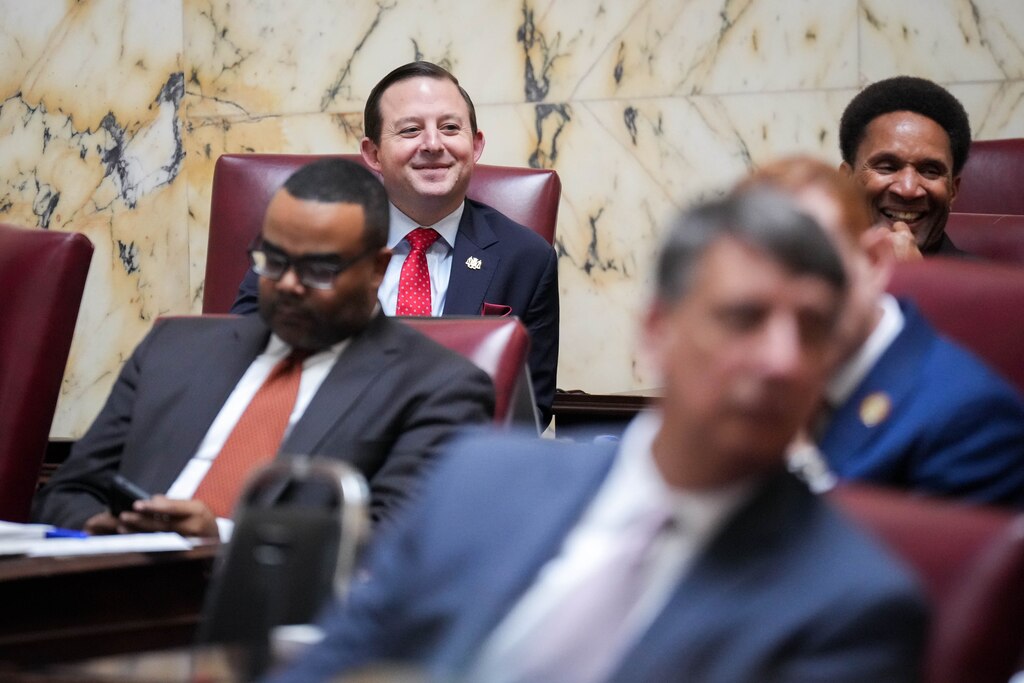Maryland lawmakers gaveled in the 2025 legislative session Wednesday amid the backdrop of a massive budget crisis sure to loom over most of the state’s 90-day lawmaking season.
There were new year’s pleasantries, handshakes and backslapping hugs exchanged among colleagues in the Maryland State House, but talk of the nearly $3 billion hole was hard to escape and echoed throughout the marble hallways.
Gov. Wes Moore previewed that his budget — out next week — will include billions in spending cuts. Sen. President Bill Ferguson said the state will avoid touching its billion dollar savings account, known as the Rainy Day Fund. House Speaker Adrienne A. Jones said she’ll use the budget as a tool to protect key investments, such as education, health care and transportation.
Moore and top Democratic and Republican leaders held interviews and news conferences, repeating messages about the “tough” road ahead and the decisions to follow.
The Baltimore Banner thanks its sponsors. Become one.
Also top of mind is the incoming Trump administration and its possible effects on Maryland. Just how lawmakers will respond to yet-to-be-decided federal policies floated more question marks over the chambers. Lawmakers have said they’re planning to hold the federal government to its financial commitments, but when possible may look to backfill losses with state funds.
Dignitaries from across the state, from mayors to county executives to congress members, visited the House of Delegates’ and Senate’s first floor sessions. General Assembly members in both chambers invited their families. Some held young children on their laps and a baby in the House let out a happy squeal as members carried on with daily business.
Moore, on brand, was perhaps the most upbeat person in Annapolis, stopping by both the House and Senate sessions to share his enthusiasm for the work ahead.
”This is going to be an exciting 90 days!” the Democratic governor declared to state senators. He delivered a similar message to the House of Delegates.
But the rest of the day, in interviews and press conferences, Moore acknowledged that he’s planning to cut $2 billion worth of planned spending in order to help close a budget gap that’s estimated to be $2.9 billion.
The Baltimore Banner thanks its sponsors. Become one.
”We’ve got to be serious about this,” Moore said at an early-morning onstage interview.
The governor wouldn’t say whether raising taxes or fees would be part of the budget solution, just that he has a “high bar” for making such a move.
Senate and House leaders set the tone

House Speaker Adrienne A. Jones reminded members the House has the budget first this session, and said they’ll use the opportunity to reflect their values.
“I don’t know about you, but I think our values are something worth fighting for,” she said from the dais after members reelected her to lead their chamber.
“It’s not easy to put aside what we like to do in favor of what we have to do,” she said, acknowledging that conversations ahead include raising revenues and cutting programs.
The Baltimore Banner thanks its sponsors. Become one.
Across the hall in the Senate, Ferguson described the budget challenge as an opportunity for partners at all levels of government to “come together and really define what do we want our future to look like.”
He said the General Assembly has worked together to overcome tough times before, such as during the COVID-19 pandemic, and can do so again.
He highlighted the state legislature’s speedy response to help businesses and individuals out of work after the Francis Scott Key Bridge collapsed and the federal delegation’s work to secure full federal funding for the bridge rebuild.
“That is what’s possible when we come together to find ways to solve problems together,” he said.
Republicans said the deficit shows that the financial consequences they have warned about for years are finally coming home to roost, and vowed to push back against any effort to raise taxes or fees.
The Baltimore Banner thanks its sponsors. Become one.
Sen. Stephen Hershey, an Eastern Shore Republican and Senate minority leader, told his colleagues the state needs to live within its means just as Maryland families do, and said raising taxes should not be the solution.
”We cannot afford to let fiscal irresponsibility threaten the stability of our economy or the well-being of our constituents,” he said.
Last year, Republican lawmakers strongly opposed Democratic votes to boost revenues by raising some taxes and fees.
“Let me be clear, raising taxes on hard working Marylanders is not the solution,” Hershey said.
Leadership elected

Both chambers reelected their Democratic leaders. Jones of Baltimore County and Ferguson from Baltimore won in unanimous votes.
The Baltimore Banner thanks its sponsors. Become one.
Del. Dana Stein of Baltimore County was elected again as speaker pro tempore, and Sen. Malcolm Augustine, a Prince George’s County Democrat, will serve as president pro tempore.
The Republican caucus also elected their leaders. Ahead of opening day, House Republicans re-elected Dels. Jason Buckel of Allegany County and Jesse Pippy of Frederick County to lead their caucus.
Buckel will serve as minority leader, a position he has held since 2021, and Pippy has served as minority whip since 2023.
“The upcoming session will be the most difficult our state has seen in decades,” Pippy said in a statement out Tuesday. “And I know our members will offer thoughtful, common-sense solutions to put Maryland on a solid footing.”
Hershey and Sen. Justin Ready, representing Carroll and Frederick counties, will again lead the Republican Senate Caucus as minority leader and minority whip, respectively.
The Baltimore Banner thanks its sponsors. Become one.
New faces, new places
November’s election and Moore’s administrative appointments left some vacant General Assembly seats for both parties to fill.
The House gained four new members since its last session, two from each party. Democrats Sara Love of Montgomery County and Shaneka Henson of Anne Arundel County, both formerly delegates, moved to the Senate. All were approved by their counties’ central committees and appointed by Moore. A handful of vacancies remain.



Comments
Welcome to The Banner's subscriber-only commenting community. Please review our community guidelines.